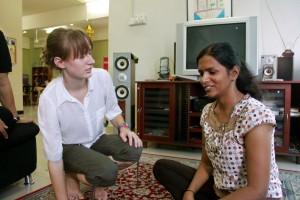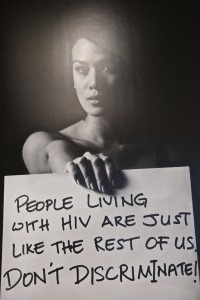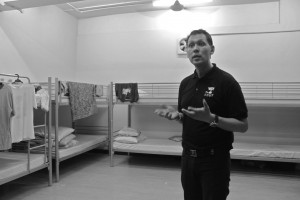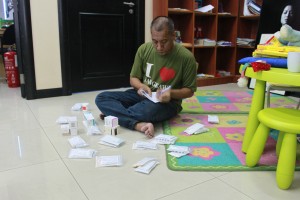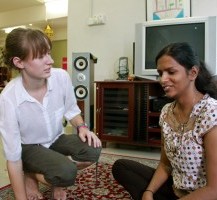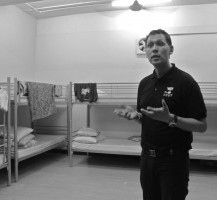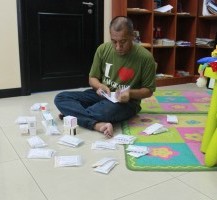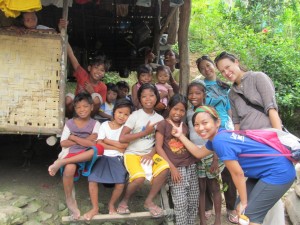 “Go where there is greater need,” these words on a poster promoting volunteer opportunities with the Jesuit Volunteers Philippines (JVP), caught Camille Tacastacas’ attention. To participate in JVP, Camille needed to be a college graduate, so the poster got filed away in the back of her mind. A few years later, after graduating from Ateneo de Manila University in the Philippines, Camille moved to the United States. In a struggling U.S. job market, she found herself working as a preschool teacher. She enjoyed her work but she could not forget the JVP poster and the pull to serve in the most under-resourced communities in her home country. She applied to become a Jesuit Volunteer, got accepted, and moved back to serve full-time in Culion, Palawan. Due to her background in early childhood education, she was placed with Cartwheel Foundation, Inc., an organization that partners with Indigenous Peoples (IP) to preserve their culture and empower the community through education programs. In Culion, Camille worked with two Tagbanua island communities. I conducted an interview with Camille about her experience:
“Go where there is greater need,” these words on a poster promoting volunteer opportunities with the Jesuit Volunteers Philippines (JVP), caught Camille Tacastacas’ attention. To participate in JVP, Camille needed to be a college graduate, so the poster got filed away in the back of her mind. A few years later, after graduating from Ateneo de Manila University in the Philippines, Camille moved to the United States. In a struggling U.S. job market, she found herself working as a preschool teacher. She enjoyed her work but she could not forget the JVP poster and the pull to serve in the most under-resourced communities in her home country. She applied to become a Jesuit Volunteer, got accepted, and moved back to serve full-time in Culion, Palawan. Due to her background in early childhood education, she was placed with Cartwheel Foundation, Inc., an organization that partners with Indigenous Peoples (IP) to preserve their culture and empower the community through education programs. In Culion, Camille worked with two Tagbanua island communities. I conducted an interview with Camille about her experience:
What were some challenges you faced on the island?
Camille spoke of the lack of luxuries on the island, so sparse compared to her life in the Philippines and here in the US. “[We] only had electricity from noon ‘til 11pm each day. We would go days without running water, which is funny because we lived in an island; getting fresh water was a problem.”
She mentioned the slower pace of life on the island. She was living a simple life – no toilets when she would stay a few days in the IP communities. But she reflects:
“Simplicity can teach you more than you could ever ask for… really seeing the beauty of life, there was no sitting down and watching TV. We were telling stories, and it was beautiful.”
What parts of service made you feel out of your comfort zone?
Camille answered this question by ranting (passionately) about the blatant injustices in her country and the world:
“It was a different kind of poverty. I met older adults in their 80s who had never sat in a classroom before, but are very eager to learn to read and write.”
“Watching a 9-year old kid learn to read for the first time was rewarding. That gave so much meaning to the mission. Then you remember what you started with: cement floors and empty rice sacks as seats. When we got funds and the communities got involved, they built their own chairs and put up their own classroom walls made out of nipa…They (the community) were grateful for the simplest of things – even to see make-shift chairs in their classroom in the islands.”
As Camille shared, she expressed her gratitude to nongovernmental organizations or nonprofits which partner with the government in filling the gaps and providing basic social services.
“In Cartwheel Foundation, we target education but we do not turn a blind eye to the other needs of the community. For example, we partnered with an organization that specializes in water systems when we found that one Tagbanua community had to hike a few miles through the mountains to transport potable water on their shoulders. Even the children did this for their families. They were content and saw this as part of life, but were grateful to have a water source closer to their homes.”
Is there a specific memory you can share?
“[Two of our students] were learning to read, so I would write on their notebooks and I would point to each syllable, one at a time. They were stringing letter sounds into syllables, syllables into words, words into sentences. We all just looked at each other, amazed, because these two 9-year olds just learned how to read.” Camille told this story with magic in her voice. “…Being a witness to the clicking of the light bulb is just something else. Thinking about these children starting their own families in the future, and being able teach their children how to read and write…it’s a drop in the ocean, but definitely one step to solving illiteracy in this Tagbanua community.”
How did this shape your career?
“I always knew I wanted to work in nonprofits, but [after JVP] I knew I wanted to work with programs. I wanted to be on the ground, implementing programs and measuring outcomes.”
How did the experience change you?
“I began looking at people and understanding that they are going through a lot. So you have to treat everyone you meet with love and kindness…everyone has a story to tell.”
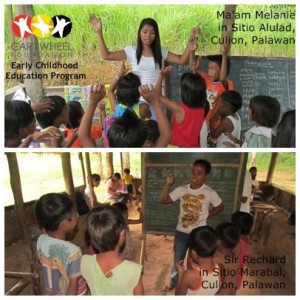 Why should others serve?
Why should others serve?
“I read somewhere that a year of full-time volunteering corresponds to three years of employment. The organization you will work with will definitely stretch you, challenge you, and bring out the best in you. More than any of that, though, we should serve because in this short lifetime, we ought to participate by giving of ourselves – our time, talent, and treasure. A disclaimer, though: at the end of it, you’ll be surprised that in your giving, what you receive is beyond any of your expectations. Go, fellow young adult, and embrace a life-enriching year!”
Jesuit Volunteers Philippines (JVP) is a lay organization of young men and women who assist in social, pastoral, and development work of NGOs, schools, and social development agencies across the Philippines.
Cartwheel Foundation, Inc. seeks to give indigenous youth and communities the chance to enjoy their right to quality and culturally-relevant education.
Interview conducted by Anna Lenhart



